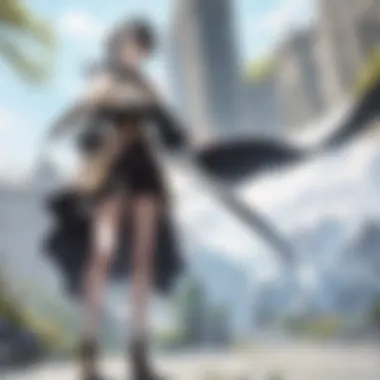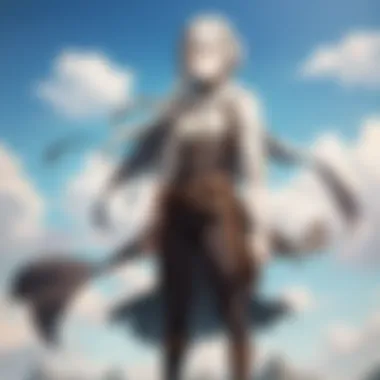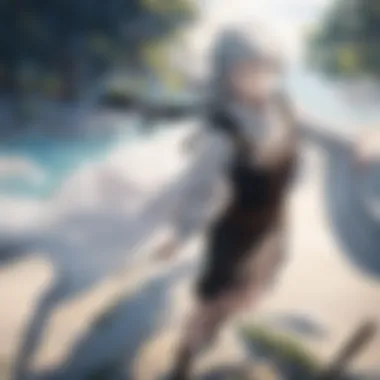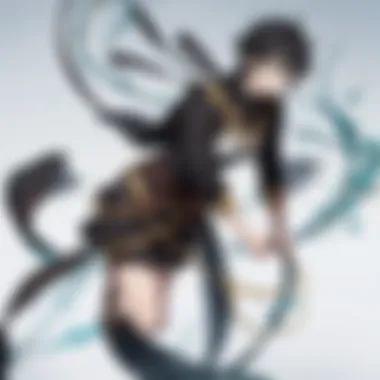Exploring Black Clover Season 4: A Comprehensive Review


Intro
Black Clover Season 4 marks a significant phase in the anime's overall narrative. It explores the adventures of Asta and his friends as they confront formidable foes and navigate complex challenges. In this season, the storytelling deepens, bringing more intricate plotlines and character dynamics to the forefront.
The examination of critical points in this season reveals how character relationships evolve. In addition, the themes capture a broad spectrum of emotions and philosophical inquiries.
In our review, we will dissect these elements, focusing on character profiles, theme exploration, and connections to the broader anime landscape. This analysis aims to enrich the viewing experience for both casual watchers and dedicated enthusiasts of the series.
Character Profiles
Overview of Main Characters
At the heart of Black Clover Season 4 are the main characters, whose journeys continue to captivate audiences.
Asta, the determined protagonist, remains a symbol of unwavering ambition and resilience. His growth as a magic knight is evident as he faces stronger adversaries, particularly during battles that test his limits.
Yuno, Asta's rival and childhood friend, also progresses significantly. His leadership qualities and magical prowess come into focus, illustrating the contrasts and parallel growth between him and Asta.
Noelle Silva, is an essential character as well. Her development leans heavily on overcoming her family legacy and embracing her abilities more confidently.
Supporting Characters
The supporting cast is equally robust and enriching. Characters like Mimosa Vermillion and Luck Voltia provide additional layers to the narrative. Mimosa’s growth in her healing abilities plays a vital role in the story arc. Luck’s unpredictable nature and electrifying magic offer humor and excitement, balancing the more serious tones.
Gordon Agrippa, the often overlooked member of the Black Bulls, shows surprising strength and character depth. His unique magic and personality traits engage the viewers in unexpected ways.
Theme Exploration
Central Themes
The central themes of Season 4 revolve around friendship, ambition, and the quest for identity. These elements give viewers valuable insights into the character's motivations and struggles. The season presents challenges that test not only their powers but the very essence of their relationships.
The theme of perseverance is also prominent. Characters face personal obstacles, making it evident that triumph often demands significant sacrifice and growth.
Cultural References
Black Clover Season 4 subtly weaves in cultural references that resonate deeply with the audience. From traditional values of hard work to notions of camaraderie, these aspects reflect societal ideals that viewers can relate to, bridging the gap between the fictional world and real life.
"The journey of a magic knight is not just about power; it is a testament to the bonds we create and how we choose to face adversity."
The End
As the series evolves, it not only captivates fans but challenges them to reflect on their aspirations and connections with others. By exploring these elements, we gain a comprehensive understanding of why Black Clover remains a staple in the realm of anime.
Preamble to Black Clover
In the realm of anime, Black Clover stands out due to its engaging narrative and character-driven plots. This series has captivated audiences with its unique blend of magic, determination, and a sense of adventure that appeals to a wide demographic. Understanding Black Clover is vital for anyone who wants to appreciate the intricate storytelling and development that unfolds over its seasons. Season 4, in particular, marks a pivotal point in both plot progression and character arcs, warranting a closer look to comprehend its significance fully.
Overview of the Series


Black Clover is anchored in a fantasy world where magic is a common element, and individuals strive to become the Wizard King. The main character, Asta, possesses an unwavering determination despite being born without any magical abilities. This contrast to the magical world around him exemplifies the themes of hard work and perseverance. The series also heavily features the character Yuno, Asta's rival and childhood friend, who embodies the talent and natural ability that Asta lacks. The dynamic between these two characters, their rivalry, and friendship drives much of the narrative.
The storyline intertwines multiple characters and factions, creating a rich tapestry of motivations and conflicts. Each character brings their own strengths and weaknesses, contributing to the overall emphasis on teamwork and growth within the Black Clover universe.
Significance of Season
Season 4 of Black Clover is particularly significant as it transitions from earlier plotlines into new territories, both thematically and narratively. This season takes bold steps to deepen character development and expand world-building concepts. In this season, Asta and his companions face greater threats and challenges that test their limits and resolve.
Moreover, the fourth season introduces new characters and factions, thus broadening the scope of the narrative. These elements not only provide fresh conflicts but also enrich the existing lore of the series. The culmination of these factors renders Season 4 essential for understanding the series' progression.
"In Black Clover, personal growth often mirrors the broader thematic elements, making each character's journey crucial to the story."
By analyzing the key characteristics and events from this season, fans gain insights into the narrative structure and thematic exploration that set in motion the events that follow. This comprehensive review will unpack these elements intricately, showcasing why Season 4 holds a distinct place in the series overall.
Plot Summary of Season
The plot summary of Season 4 is significant in understanding the progression of the series. This season marks a critical juncture in the Black Clover narrative, as it expands on key themes and provides resolutions to character arcs that have been evolving since the beginning. Analyzing the plot allows viewers to appreciate the intricate world-building and character dynamics that are central to the story. This summary serves as the foundation to explore the complex interplay of relationships and conflicts that make Black Clover both compelling and relatable.
Key Story Arcs
In Season 4, several pivotal story arcs emerge that deepen the narrative complexity. One primary arc involves Asta, who continues his relentless pursuit to become Wizard King. This ambition becomes the driving force behind his actions, leading to significant encounters with both allies and adversaries. Moreover, the storyline surrounding the Spade Kingdom adds layers of depth. The introduction of powerful demons and their schemes for domination creates a tense atmosphere throughout the season. It challenges not only the Black Bulls but also the dynamics within the Clover Kingdom.
Additionally, the arc related to the Heart Kingdom showcases the alliances formed between different factions. Characters like Noelle Silva also gain focus as she confronts her own identity and familial ties. This journey is not merely about fighting forces but discovering self-worth and the power of teamwork.
The contrast between these arcs brings a balance to action sequences and emotional depth. Each episode weaves together the personal stakes of the characters with broader political tensions, enriching viewer engagement.
Major Conflicts
Conflicts in Season 4 are a distinguishable feature that propels the story forward. The Battle for the Clover Kingdom assumes center stage as enemies from the Spade Kingdom pose a formidable threat. This clash illustrates the stakes involved, not just in terms of battles, but in protecting what each character values most.
The internal struggles of key characters add an additional layer of complexity. Asta grapples with his lack of magic, facing societal prejudice while striving for greatness. His devotion to his friends, specifically Yuno, is tested. This rivalry reminds viewers of their shared history, serving both as a motivating force and an emotional anchor.
Moreover, the moral dilemmas presented during confrontations raise questions about justice and sacrifice. Characters like Mereoleona Vermillion showcase fierce loyalty and determination, while their opponents force them to confront unpleasant truths about their own convictions. These conflicts resonate deeply, emphasizing the duality of heroism and villainy in the context of loyalty, sacrifice, and personal growth.
"The stakes have never been higher in Season 4, where personal beliefs clash with overarching goals, redefining what it means to be a hero in the world of Black Clover."
Understanding these conflicts not only highlights the story’s tension but also reveals the growth of the characters involved. This intricate web of battles and personal conflicts makes Season 4 a vital chapter in the Black Clover saga. The resolution of these key conflicts will undoubtedly shape the trajectory of future seasons.
Character Development
The character development in Black Clover Season 4 plays a crucial role that extends beyond mere entertainment. It serves as a vehicle for exploring themes of growth, resilience, and the complex nature of interpersonal relationships. Observing characters adapt or transform offers viewers deeper engagement with the narrative. In this analysis, we will examine key aspects of character development, focusing on Asta, supporting characters, and the season's antagonists.
Asta's Evolution
Asta has undergone notable evolution throughout the series, but Season 4 emphasizes this transformation even more. Initially characterized by his overwhelming determination and relentless pursuit of his dreams, Asta's character is fleshed out to demonstrate the struggle of overcoming self-doubt. His growth is not solely about gaining power; it symbolizes the importance of personal struggle and perseverance in the face of adversity.
As he confronts stronger foes, Asta learns to harness his abilities more effectively while developing valuable relationships with his peers. This season reveals his determination to protect his friends, which further contributes to his maturity. Viewers see how Asta's sheer will can inspire those around him, showcasing the idea that leadership comes from trying one's best, not just from strength.
Supporting Characters


Supporting characters play a pivotal role in enriching the narrative in Season 4. Each character is expertly designed to complement Asta's journey while exploring their own arcs. The relationships between them serve as a backdrop for exploring various themes.
- Yuno: Yuno's rivalry with Asta pushes them both towards greatness. His unique growth trajectory contrasts Asta's, highlighting different approaches to ambition and talent.
- Noelle: Noelle's struggle with her noble background and her insecurities reflects the theme of identity. Her development serves as a reminder that true strength lies in accepting oneself.
- Other Members of the Black Bulls: Characters like Charmy and Magma are given brief moments in the spotlight, adding depth to the group dynamic and emphasizing the importance of camaraderie.
Overall, the character development in Season 4 is rich and multifaceted, allowing for complex interactions that enhance the overarching narrative of Black Clover.
Antagonists of Season
Antagonists in Black Clover Season 4 are crafted with nuance, making them compelling and effective. Unlike static villains, these characters often evolve themselves, adding layers to their motivations.
- Lucifero: As a representation of existential dread and power, Lucifero serves as a formidable challenge for Asta and his friends, pushing them to their limits and forcing them to confront their fears. His motivations remain enigmatic, thus drawing the audience into his complex character.
- Other Antagonists: Supporting villains include a variety of characters that explore themes like ambition and corruption. They provide essential conflicts that facilitate significant character growth among our heroes.
In sum, antagonists contribute to not just action, but also to profound moments of revelation and growth for the main cast. Their presence is crucial in driving the story forward and shaping the characters' development throughout the season.
Themes Explored in Season
Season 4 of Black Clover delves into multiple themes that resonate both with the characters and the audience. These themes are crucial for understanding not just the narrative but also the emotional undercurrents that propel the story forward. The exploration of themes such as friendship, rivalry, identity, and purpose enhances the viewer's connection to the series. It elevates the stakes in the story and gives depth to the character arcs.
By examining these themes, we uncover how they interact and influence character behavior and decisions. They reflect the struggles of the characters while also resonating with the personal experiences of the viewers. Themes in Black Clover are not merely backdrop elements; they are intrinsic to the ideological fabric of the series. This deep understanding can lead to greater appreciation and analysis of the anime.
Friendship and Rivalry
Friendship and rivalry form the core dynamic that drives many interactions among characters in Season 4. The bonds formed between characters such as Asta and Yuno are emblematic of deep commitment and mutual respect. Their contrasting yet complementary qualities propel the narrative and enhance the theme of friendship. Asta's unwavering support for his friends contrasts sharply with the competitive nature of Yuno, creating a rich ground for character development.
This season accentuates these relationships under intense circumstances. Conflicts arise that test friendships, forcing characters to confront their insecurities. These moments showcase how rivalry can sometimes motivate, pushing characters to exceed their limits while preserving the essence of camaraderie. The emotional stakes are high, making the conflicts both impactful and relatable.
The between friendships and rivalries creates compelling narratives that captivate audiences.
Additionally, friendships among the Black Bulls team demonstrate how diverse backgrounds can unite individuals toward a common purpose. The sense of belonging and support experienced by Asta and his comrades is uplifting. It signifies the importance of collaboration in achieving goals, whether in a fictional world or real life.
Identity and Purpose
The quest for identity and purpose becomes increasingly prominent in this season. Characters like Asta, who start with little knowledge of their abilities, grapple with their self-worth and ambitions. This journey of self-discovery is portrayed with poignancy as characters face challenges that question their values and motivations.
The theme of identity also reflects the struggles of various characters dealing with their pasts. The revelations about their backgrounds shape their development, leading to profound moments of realization. Asta, for example, must confront his limitations while striving to become the Wizard King, a desire that defines his character arc.
Purpose in Season 4 is more than just a goal; it is intertwined with the personal growth of characters. Each battle or challenge faced is a reflection of their internal conflicts. As they gather allies and strengthen their resolve, viewers witness a transition in character motivations. What was once a mere ambition becomes a heartfelt drive shaped by experiences, failures, and successes.
In summary, Season 4 of Black Clover utilizes these thematic elements to engage the audience on a deeper level. The exploration of friendship, rivalry, identity, and purpose not only enhances the narrative but also draws viewers into a rich emotional landscape, fostering a connection that resonates beyond the screen.
Visual and Artistic Elements
The visual and artistic components of Black Clover Season 4 play a crucial role in delivering the story's depth and intensity. This season showcases a significant evolution in animation techniques and character designs, contributing to the overall enjoyment and engagement of viewers.
Animation Quality
The animation quality in Black Clover Season 4 is a standout feature. The studio, Pierrot, has demonstrated remarkable growth in its animation capabilities. Action sequences are fluid and highly detailed, allowing viewers to immerse themselves in the battle scenes.
In particular, the depiction of magic spells has improved. They are more vibrant and dynamic, adding a layer of excitement during confrontations. The fluid transitions between character movements enhance the realism, making the viewers feel as if they are part of the action.
It's essential to note how the animation complements the story. When characters face challenges and emotional conflicts, the animation reflects these moments with subtle changes in expressions and movements. This attentiveness to detail elevates emotional stakes and allows for a stronger connection between the audience and the characters.


Character Designs
Character designs have also evolved in this season. Each character's appearance reflects their growth and experiences throughout the plot. For instance, Asta's design has taken on new features that symbolize his increased power and maturity. The use of distinctive color palettes makes characters recognizable and emphasizes their uniqueness.
Moreover, the designs of supporting characters have received notable attention. Each character is crafted with a distinct personality, evidenced by their clothing styles and gestures. This attention to detail enriches interactions among characters and enhances individual story arcs. Targeted designs help in establishing relationships, whether through rivalry or camaraderie.
Sound and Score
The auditory elements within Black Clover Season 4 play a crucial role in shaping the viewer's experience. The sound design ensures that each scene resonates with the emotional tone established through the narrative. This section delves into the significant aspects of sound and score that enhance storytelling, elevate character moments, and contribute to the overall atmosphere of the anime.
Opening and Ending Themes
The opening and ending themes in Black Clover Season 4 showcase the show's dedication to integrating music into its core identity. The choice of music is never random; it is a carefully selected piece that encapsulates the season's spirit. The opening theme, performed by the band FLOW, exudes energy and excitement, setting a fast-paced tone that aligns with Asta's relentless determination. The energetic rhythm and powerful vocals create an atmosphere that compels viewers to engage right from the start.
In contrast, the ending theme takes a more introspective approach, offering a moment of reflection after the emotional ride of each episode. Performed by Mika Kobayashi, this piece emphasizes themes of friendship and growth, aligning with the developments characters experience throughout the season. The intentional juxtaposition of these themes invites viewers to reflect on the episodes, reinforcing the narrative arcs presented.
Background Score
The background score in Black Clover Season 4 is another vital component that deserves attention. Composed by Minako Seki, the score is characterized by a variety of musical styles, including orchestral arrangements, electronic elements, and traditional Japanese instruments. This blend allows for a rich auditory palette that enhances key moments without overshadowing character dialogues or plot development.
For instance, during intense battle scenes, the score escalates, with crescendos that synchronize perfectly with the visual action. This not only heightens excitement for the viewer but also underscores the stakes involved in the conflicts. The ambient scores during quieter moments serve to ground viewers, fostering a connection to the characters' internal struggles and triumphs.
Overall, both the opening and ending themes, along with the background score, work in tandem to create a cohesive emotional journey. They enhance the viewing experience by integrating sound and narrative in a way that resonates with the audience, making the auditory elements as significant as the visual storytelling. In a series that emphasizes growth and perseverance, the sound design becomes another tool to elevate its profound messages.
Cultural Impact and Reception
Exploring the cultural impact and reception of Black Clover Season 4 provides meaningful context to its significance within the anime industry. This aspect highlights how the season resonates with audiences and contributes to broader conversations surrounding anime themes and narratives. Importantly, it constructs a bridge between artistic expression and viewer engagement.
Viewer Reception
The reception among viewers has been overwhelmingly positive. Many fans appreciate the depth of character development and the complexity found in the plot arcs this season. Social media platforms like Reddit and Facebook serve as forums for fans to convey their thoughts. On these platforms, discussions often revolve around pacing and emotional stakes, suggesting a strong connection individuals feel toward the characters and their journeys.
A few elements contribute to this positive reception:
- Character Relatability: Viewers often find themselves relating to Asta’s persistent drive, providing a sense of inspiration and motivation.
- Improvement in Animation Quality: Compared to earlier seasons, many fans note an enhancement in animation quality, making action scenes more engaging and visually appealing.
- Narrative Complexity: The nuanced storytelling allows for deeper discussions among fans, creating a vibrant community.
Critical Acclaim
Critics have similarly recognized the achievements of Black Clover Season 4. Reviews often highlight the successful integration of various themes. These might include loyalty, courage, and the struggle against personal limitations. Such common themes resonate widely, allowing the series to appeal to diverse audiences.
In instances, professionals cite the following points in their evaluations:
- Balanced Character Dynamics: There is thoughtful attention to the balance between protagonists and antagonists, enriching the overall narrative.
- Depth of Themes: Critics appreciate the exploration of heavier themes, such as sacrifice and teamwork, compared to some earlier arcs.
- Visual Consistency: Critics also acknowledge the maintained consistency in the visual style, which enhances immersion.
Overall, the cultural impact of Season 4 can be seen in both viewer enjoyment and critical discussions. This recognition solidifies Black Clover’s place in modern anime culture. It validates the efforts of the creators, particularly in an increasingly competitive landscape.
Epilogue
The conclusion of any lengthy analysis serves as a crucial summary point, drawing together diverse threads from the preceding sections. In this article, the conclusion emphasizes the significance of Black Clover Season 4 within the larger narrative framework and its contribution to the ongoing character developments and thematic exploration established in earlier seasons.
Final Thoughts on the Season
Season 4 of Black Clover stands out due to its portrayal of both progression and conflict. Characters like Asta and his companions face new challenges, further solidifying their identity and purpose. The dynamics of friendships and rivalries are examined deeply, which adds complexity to character motivations. This season provides gratifying resolutions to ongoing arcs while introducing new layers of intrigue. Overall, it builds upon the solid foundation of previous seasons, making it a pivotal chapter in the Black Clover saga.
Future Prospects for Black Clover
Looking ahead, the future of Black Clover appears promising. The developments in Season 4 hint at even greater stakes in upcoming story arcs. The success of the anime could lead to adaptations of manga storylines not yet animated. Moreover, as viewer engagement continues, the expansion of the world and deeper characterization will likely attract a growing audience. The blend of action, friendship, and the exploration of purpose paves the way for continued viewer investment. Therefore, the implications of this season could extend not only within the narrative but also within the broader anime context, maintaining its relevance in the ever-evolving landscape of anime entertainment.







